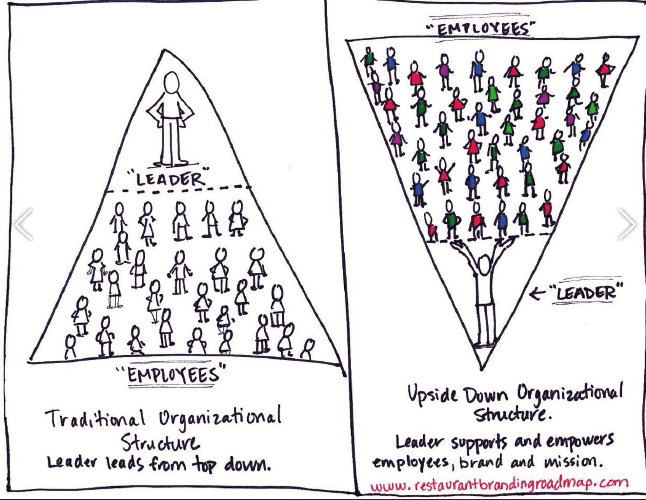Is Your Company Freedom-Form? Checklist for HR

Imagine if you could be a creative genius, if you could take on any project you wanted and become so invested in it that the cogs spun in your head 24 hours a day without any distractions. You would be royalty, with the power to achieve anything, but you’d also be a slave to whatever passion you immersed yourself in.
“Freedom-form” companies allow their employees to be ruled by passion. In exchange for that freedom, each employee is responsible for creating original, independent work that drives their joy. This type of company is rare and does not exist for most people, but it does inspire.
So, with the checklist below, let’s see what it takes to be a freedom-form company and if your company is living up to this high standard.
Freedom-form is Micromanaging Opposite but More
A “freedom-form” company might sound like a fancy term, but it has a great substance that’s in all ways opposite to micromanaging and controlling work environments that many are unfortunate to experience.
In Isaac Getz’s “Liberating Leadership: How the Initiative-Freeing Radical Organizational Form Has Been Successfully Adopted” article (which we highly recommend reading!), “freedom-form,” or “liberated,” company is one that gives employees complete freedom and responsibility to act as they decide would be best.
What that involves is a complex yet reachable work organization that highlights individual talent and initiative, letting them become bearers of the company vision. That requires responsibility from employees and outstanding communication from leadership.
Only a few companies check out all of the points below. The term “freedom-form” often goes with “radical” in a definition. However, our checklist’s purpose is not to gatekeep HR specialists from some ideal. Lacking a “yes” to some questions doesn’t mean your company isn’t liberated. You’ll see why as we go deeper into the freedom-form philosophy, but just for fun, let’s see how many you can get!
Do Employees Show Initiative?
You can’t force initiative, but you can help it. First, ask yourself this: as soon as there’s a problem, who do employees turn to? Suppose they try to solve the issue themselves or approach their manager with a list of solutions. In that case, you do have responsible individuals caring for the vision and well-being of the company. The trick is making sure that people are aware of the issue and want to do something about it.
Another question to monitor: do employees set their own performance goals and keep track of them? Working with managers and the HR department is needed here, and the personal drive based on skills and ambition is essential for every employee in a liberated company. If it’s not there, the work freedom given to people might bring catastrophic results.
In a liberating company, leaders communicate that initiative is positively regarded. Any failure that comes with it should be perceived positively because it’s a learning and valuable experience.
Are Employees Self-Motivated?
Personal initiative is closely connected with a sense of purpose and meaning, the first things people appreciate about their jobs today (higher than their salary, for example). So if people are driven by their sense of value and can see the relevance in their work, they’ll show initiative without being prompted.
Solve problems, share ideas, praise and celebrate coworkers to make the employees’ participation necessary for the company to thrive.
Is Your Team Equal?
This one is all about equal chances. People should get a fair chance to advance their careers and get new opportunities to show their skills. Company leaders and HR representatives should consider complaints for fair treatment and take necessary measures to ensure that company standards and language are applied. Especially as companies transition to hybrid working and leave the need to address inequities in new work realities unnoticed.
Practice transparency. Company leaders must overcome the fear of political correctness and build a healthy habit of creating an open culture where no sensitive topics are out of the discussion. By the way, this is exactly what liberating structures are created for.
Freedom-form companies level salaries of women with those of men in the same positions, in addition to creating an overall work environment that favors growth and flexibility. This is exactly what women in particular search for in a workplace, as this McKinsey&Company study shows. In addition, freedom-form companies often practice a 4-day work week, so that parents can dedicate time to their children.
Do Employees Feel Like They “Own” the Product?
A liberating structure is all about empowering people to take full ownership of their job and their company. A fun way to check this is to learn if employees have associations involving company values in various situations.
Just a few examples: they’re managing their children’s creative camp and use approaches based on their company vision; they are selling the company product to some new friends at a bar far beyond billable hours.
These examples reflect the alignment of the company vision with the person’s values. Such employees should have an active say in company decisions that affect their work and life. They should feel free to share their ideas, run projects, and own their work.
Are Employees Free to Make Operational Decisions?
This is the ultimate test for a company that aims for the autonomy of its employees. If these employees feel empowered to make daily operational decisions that affect their goals, they will do their best to align those with the company’s vision and values.
This kind of freedom has many advantages, but it can backfire as well. So liberating leaders need to establish clear guidelines for operational decisions and line managers responsible for training.
However, when done right, a liberating company can lead to a higher employee retention rate and better customer satisfaction, resulting in tremendous company success and growth.
Can Company Employees Easily Initiate Transfers Between Teams?
While this aspect may vary greatly depending on the size and structure of a company, the core idea stands: lack of invasive management includes employee freedom to choose teams to work with. Transfers are necessary for creative, technical, and scientific fields to boost innovations and productivity.
A prerequisite and outcome of such freedom is extensive communication: between departments and individuals. It takes knowledge of multiple companies’ processes to envision yourself in another team working on another aspect of a product.
For the HR department, promoting transfer opportunities and cross-department collaboration is vital. In addition, it further pushes employee initiative and cultivates entrepreneurial spirit.
Does Your Company Provide Training?
This one is essential for a freedom-form company. Employee initiative and responsibility for the company product are only possible when backed by considerable skills. People with stellar skills tend to find the most efficient processes and routines.
So a liberating company invests in its people, expands their skills with in-house training, and encourages learning elsewhere, too. It fosters a culture of innovation, trust, personal accountability, and problem-solving, which results in higher employee engagement and better overall organizational performance.
Does Everyone Practice Hot Desking? Yes, and the CEO, too
Having a shared open space and doing hot desking says a lot about company values and encourages employee participation with management and the CEO.
Hot desking means employees occupy workstations on a “first come, first serve” basis. There’re no assigned workplaces. One day, you sit by a project mate, and the next day you rub shoulders with the CEO.
Hot desking creates an atmosphere for open communication, initiative, and self-organization. On top of that, as a defining characteristic of a liberated company, everyone does it.
Is Work Hours Monitoring Completely Abolished?
It sounds ironic to give decision-making freedom to people and then limit their time to use it. The trust that a liberating company puts in its employees also benefits the leaders who aid their workforce in doing their job. Indeed, there’s no need for micromanaging to get the best out of the team.
Management styles that include work tracking can feel invasive, undermine trust within the team, and even distract from actual work. If employees are constantly looking at their work-tracking software, monitoring their progress, and evaluating their performance in real time, it can lead to feelings of pressure and stress.
Moreover, work tracking systems are often rigid and inflexible. They lack the speed to adopt new ideas or processes and, hence, can stifle creativity and collaboration.
Did your Company Get Rid of a Dress Code?
Some companies only have formal wear for their employees because they’re so rigidly corporate. What does that say about their values if their principles are imposed on others?
A liberating company aims for a more natural, unforced work environment. No need to know who is who in the hierarchy or what their roles are by sight. The dress code is entirely a matter of personal choice, with absolutely no restrictions.
So if a company ditches the dress code, you can bet their underlying process is to set everyone free. As HR consultant Cherie McGill brilliantly noticed, “At the end of the day 99% of people will do the right thing and make wise wardrobe choices.” That does sound like treating employees like responsible adults they are.
Is Compensation High in Your Company?
In a liberating company, individual achievements are rewarded while the team’s success is recognized. Moreover, through a highly transparent system, people understand how their work and the company’s performance link together.
The pay is equal, fair, and high. However, many leaders of freedom-form companies consider the multiple advantages of their philosophy as “psychic income” that goes along with the material benefit. And these advantages, not the amount of compensation, are the reason for building highly productive teams. Freedom-form philosophy is about vision and healthy competition in a job market, not motivation with money.
Does Your Company Provide Benefits?
Getting people to work for you is hard enough, so why not offer some benefits to help them stay?
A liberating company typically invests in childcare, holiday and sick pay, pension or bonus, and flexible hours and work-from-home options. These are not obligatory, but they are key aspects of a company culture that wants to ensure employee well-being and growth.
Plus, by improving employee well-being, a liberating company sees higher levels of job satisfaction, more productivity, and more focus from the workforce. As Gallup’s analysis of work culture in Europe shows, focus on well-being is exactly what employees need in order to strive.
Liberating Leadership is Key to a Freedom-form Company
Let’s take a break from the checklist to talk about liberating leadership – the engine of a freedom-form company. All attributes of a liberated company start with leadership treating their employees as adults. This means nurturing trust in everyone’s ability to do things right and aim for improvement based on personal ambition.
Moreover, liberating leaders champion the company’s philosophy themselves. They act precisely how they expect employees to act day to day, quite often under rather demanding circumstances. Liberating leaders recognize that this is a values-based journey, and they are the ones who will lead the team through its every step.
Do Leaders Share the Company Vision?
Nothing works if the people don’t fully understand the vision. But this is not about boring quarterly presentations by managers.
Liberating leaders practice company vision daily. They stay focused on the big picture but never give up the opportunity to look back. Therefore, all projects, goals, routines, and processes should reflect the more significant purpose to which they tend.
This way, a liberating atmosphere has a higher chance of meeting individual self-actualization and company-wide growth goals.
Do Company Leaders Listen to People?
If you’re interested in radical freedom at work, you should know it’s a two-way process. As much as company leaders aim to communicate the company vision, they should learn to listen to what people have to say about it.
Active listening requires more than just nodding and making agreeable noises while steering the conversation back to your agenda. Instead, the listener must be willing to ask clarifying questions, focus on the speaker, and understand the context.
Do Leaders Avoid “Managing for the 3%”?
In a team where people are free to make operational decisions, develop horizontal relationships, and enjoy company benefits that softly encourage high performance, abusers of the system might appear. Some steal stationary, and some abuse work relationships. Many managers might intuitively incline toward changing the rules or establishing new ones as a response.
This is called “managing for the 3%”, as Gordon Forward, the former CEO of Chaparral Steel, suggested. The thing is, any change of rules impacts the whole team, including those who use benefits for the good of their performance and development. Moreover, changing certain rules just breaks the freedom-form paradigm and values manifested as essential for a company.
Liberating leaders don’t change the rules based on the few abusers, i.e., don’t manage for the 3%. Instead, they get rid of the wrongdoers, as Isaac Getz puts it in his book. This might include re-positioning them but also letting them go if the situation calls for it.
Watch Isaac’s Getz TEDx talk to get inspired.
Do Your Leaders Embrace the Paradoxes of Managing a Freedom-Form Company?
As utopian as a radical freedom-form company might sound, conflicts and stress happen. In those situations, a liberating leadership style can still include conventional management. Liberating leaders are all about supporting employees as individuals yet maintaining them as a functioning and effective team, even when things go wrong.
It takes wisdom to approach the freedom-form company paradoxes, like providing employees freedom in everything yet necessitating discipline, nurturing creativity yet avoiding laziness, balancing professional growth and maintaining routines, and celebrating individualism yet ensuring proper unity.
The spirit of a freedom-form company is: everyone is their own best manager. Leaders are there to facilitate their people’s growth and embody the strategy and philosophy guiding the team. Liberating leadership shows its value by embracing paradoxes through flexibility, open communication, and reconciliation.
Build the Courage to Be the Best
One important thing to say here: just a few “yes” answers to our checklist are already a great result. All of the questions are inter-connected: you can’t talk about initiative and motivation without the encouragement of lifelong learning or about independent decision-making without employees “owning” the product. Together, all these questions merge into a comprehensive philosophy, and philosophy is not a plan with iterative steps.
Growing towards freedom-form organization does require a comprehensive strategy, though, alongside a liberating boss who lets your professionalism and intuition lead the way. Think about the aspects that need the most work within your team and the improvements that are quick and effective to take.
Above all, realize that building a freedom-form company takes courage from corporate leadership and the HR department. Without courage, it’s impossible to support change and encourage individual employees to use their talents and strengths in pursuit of success. If you dare to be the best and aim higher every day, you’re already on your way to creating a liberating workplace!

Halyna OSADCHA
Guest Writer, a Hybrid Work Devotee.





